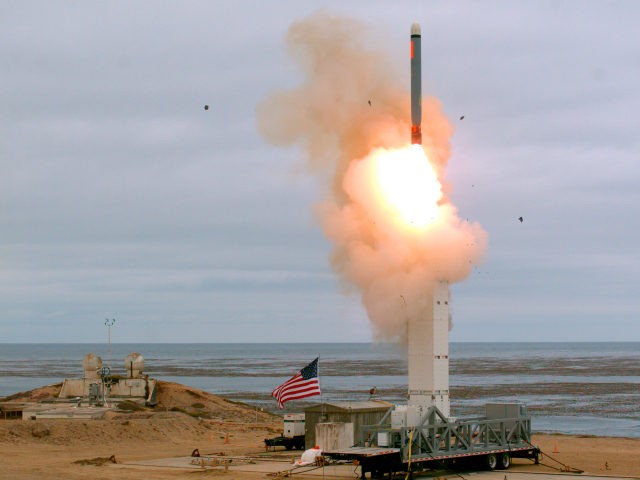Russia and China accused the United States on Tuesday of “escalating” military tensions after the Pentagon test-fired a ground-launched cruise missile banned by the Intermediate-Range Nuclear Forces Treaty (INF).
Moscow and Beijing, which U.S. intelligence and military officials say are growing closer, also said the United States’s new missile test is stoking a “new arms race.”
Sunday’s firing of the nuclear-capable Tomahawk missile marks the first such test since the U.S. pulled out of the INF on August 2. On Monday, the Pentagon revealed that the new weapon has a range of more than 310 miles.
The test came after the Pentagon noted in a recent report that Beijing is developing new nuclear weapons, including missiles.
A recent incident in the Russian arctic that left five scientists dead has raised suspicions in the U.S. that Moscow is also testing nuclear missiles. The U.S. cited Russian violations and the failure of the INF to cover China as reasons for pulling out of the treaty.
On Tuesday, Russian Deputy Foreign Minister Sergei Ryabkov lambasted the latest U.S. missile test, the Kremlin’s’ state-run TASS news agency reports, according to several media outlets.
“All this elicits regret, the United States has obviously taken the course of escalating military tensions. We will not succumb to provocations,” Ryabkov reportedly declared, referring to the test. “We won’t allow ourselves to be pulled into a costly arms race.”
China also condemned the U.S. missile test on Tuesday, warning that it could lead to “another round of the arms race” and negatively impact international and regional security.
Referring to the test, Geng Shuang, a spokesperson for China’s Foreign Ministry, told reporters:
This U.S. move will surely trigger a new round of arms race and lead to escalated military confrontation, exerting severe negative influence on international and regional security.
We advise the US to discard the out-dated cold-war and zero-sum mindset, remain restrained in military development, earnestly uphold the existing arms control system and do more to maintain global strategic balance and stability as well as international and regional peace.
The U.S. military has repeatedly warned that China’s intensified military modernization efforts and Russia, to a lesser extent, are eroding America’s military advantage.
The latest annual World Threat Assessment, issued by the American intelligence community early this year, cautioned that the strategic relationship between Russia and China is “likely to strengthen” this year.
Tensions and mutual suspicions that continue in some respects have long marred the relationship between Russia and China.
“China and Russia are expanding cooperation with each other and through international bodies to shape global rules and standards to their benefit and present a counterweight to the United States and other Western countries,” U.S. intelligence officials warned, however.
In March, the American armed forces also noted that the relationship between China and Russia is growing, particularly in Europe.
Pentagon officials announced that it “conducted a flight test of a conventionally-configured ground-launched cruise missile at San Nicolas Island, California” on Sunday, adding:
The test missile exited its ground mobile launcher and accurately impacted its target after more than 500 kilometers [about 310 miles] of flight. Data collected and lessons learned from this test will inform the Department of Defense’s development of future intermediate-range capabilities.
On Tuesday, the Russian minister reportedly noted that the Kremlin would only deploy new missiles if the United States did first.
Recent activities in Russia and China, however, indicate that an arms race may already be underway.
American officials withdrew from the INF after the United States and NATO determined that Moscow was violating the pact. The Kremlin denied the accusations.
Critics also denounced the INF because it did not cover China or missile technology that did not exist when the United States agreed to the pact.
Russia and the United States have repeatedly accused the other of violating the agreement.
In March, the U.S. military announced that it was planning to test two types of missiles banned by the INF after withdrawing from the treaty.

COMMENTS
Please let us know if you're having issues with commenting.